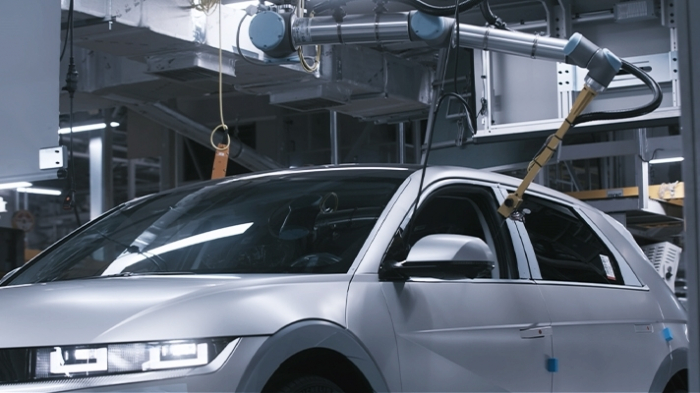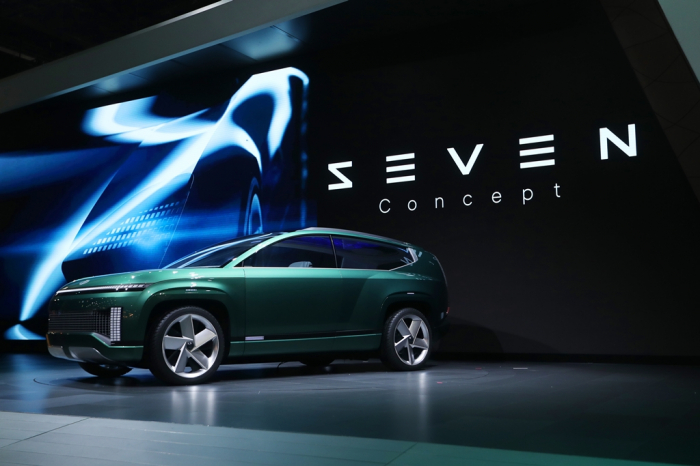Electric vehicles
Hyundai Motor to build 1st Korea plant in 29 years
South Korea’s top automaker plans to start construction of the EV plant in 2023 with target completion in 2025
By Jul 12, 2022 (Gmt+09:00)
4
Min read
Most Read
LG Chem to sell water filter business to Glenwood PE for $692 million


Kyobo Life poised to buy Japan’s SBI Group-owned savings bank


KT&G eyes overseas M&A after rejecting activist fund's offer


StockX in merger talks with Naver’s online reseller Kream


Mirae Asset to be named Korea Post’s core real estate fund operator



Hyundai and its unionized workers agreed on plans for domestic production facilities to address global automobile industry changes and measures to secure employment stability, according to the company on Tuesday. It also outlined its future vision for local plants.
The automaker is scheduled to break ground on the plant in 2023 at its Ulsan complex with a target of completion in 2025, according to the agreement. Hyundai last established a new plant in Korea in 1996 as part of its Asan complex.
Hyundai also plans to gradually revamp its oldest production line, built in 1968, for mass production of future automobiles.
“We decided on the local investment to become a leading company in the future automobile sector with EV capacity expansion and to ensure the job security of employees,” said a Hyundai official.
In addition, the company decided to resume hiring new production workers from next year, for the first time in a decade to develop talent for EV production.
The company aims to raise its EV sales to 840,000 units by 2026 and 1.9 million by 2030 from 140,000 in 2021.
MAIN EV PRODUCTION BASE
In May, Hyundai Motor Group unveiled a plan to invest 63 trillion won ($48.1 billion) in its domestic business through 2025 to strengthen its competitiveness in electrification, robotics and urban air mobility (UAM) and gasoline cars.
With the latest decision, South Korea will be the group’s main EV production base along with its planned factory in the US state of Georgia.
South Korean industry experts had predicted Hyundai would convert the existing internal combustion engine plants for domestic EV production, given the small local market, tough labor unions and low productivity.
But the group is poised to secure three production facilities at home – Hyundai’s new plant and revamped production line, as well as affiliate Kia Corp.'s purpose-built vehicle (PBV) plant to be built from 2023.
NEXT MODELS AFTER IONIQ 7, GENESIS
Hyundai’s new EV plant is expected to produce the models following the IONIQ 7, its first large-size sport utility vehicle under its standalone electric vehicle sub-brand, to be launched in 2024. The factory is also likely to roll out the premium Genesis models to be released only as EVs from 2025.

The company and the labor union agreed to hire new regular staff for production in the first half of next year.
The management has not added permanent positions at factories due to the low efficiency and uncertainties surrounding the EV industry since 2013 despite growing requests from unionized workers to increase the workforce, which shrank due to the number of retiring workers.
Hyundai changed its stance as it saw the need for EV production talent at home to secure proper quality as EVs are produced through a completely different process from that of internal combustion engine cars.
“We made a bold decision on the new plant and new hiring for the future,” said Lee Dong-seok, Hyundai’s president of production.
WIN-WIN FOR MANAGEMENT AND UNION
Both Hyundai and its unionized workers are expected to benefit from the agreement, industry sources said.
The company is set to secure a state-of-the-art EV factory, shutting an aged existing plant, while the labor union pledged to actively cooperate on key issues such as the transfer of manpower for production in line with market demand. Hyundai has had difficulties in raising the production of popular models due to the opposition of unionized workers.
Hyundai is also poised to set up a production base to meet growing EV demand at home. The country’s EV sales increased to 128,629 units last year from 63,120 units in 2020 and 41,893 units in 2019.
Global automakers are building EV plants for both local and overseas markets. Volkswagen plans to start building a new factory in Wolfsburg with an investment of 2 billion euros ($2 billion) early next year, for example.
The agreement between Hyundai and the labor union eased workers' chronic concerns over job security when the industry is shifting its paradigm to EVs from legacy engine cars.
The management vowed to give the company's unionized workers additional training on future businesses such as advanced air mobility (AAM) and PBVs at least once a year.
The company and labor union reaffirmed their agreement to develop the local research and development center, as well as factories as a global base for future businesses.
(Updated with officials' comments, details and background.)
Write to Il-Gue Kim, Han-Shin Park, Hyung-Kyu Kin and Sujin Choi at black0419@hankyung.com
Jongwoo Cheon edited this article.
More to Read
-
 AutomobilesHyundai's IONIQ 6 wins accolades for streamlined design
AutomobilesHyundai's IONIQ 6 wins accolades for streamlined designJul 04, 2022 (Gmt+09:00)
1 Min read -
 AutomobilesHyundai's woes: Too many cars rolling out of Korean plants
AutomobilesHyundai's woes: Too many cars rolling out of Korean plantsJun 21, 2022 (Gmt+09:00)
5 Min read -
 Corporate investmentHyundai to spend $30 bn on improving quality of combustion engine cars
Corporate investmentHyundai to spend $30 bn on improving quality of combustion engine carsMay 25, 2022 (Gmt+09:00)
3 Min read -
 AutomobilesKia set to break ground on purpose-built vehicle plant in 2023
AutomobilesKia set to break ground on purpose-built vehicle plant in 2023Mar 30, 2022 (Gmt+09:00)
2 Min read -
 Electric vehiclesHyundai Motor to debut IONIQ 7 concept in November LA auto show
Electric vehiclesHyundai Motor to debut IONIQ 7 concept in November LA auto showNov 04, 2021 (Gmt+09:00)
1 Min read
Comment 0
LOG IN


